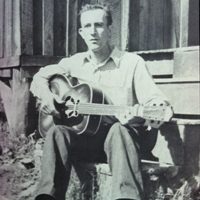
Frank Proffitt
Tom Dooley might never have become a household name outside of Northwest North Carolina had it not been for Frank Proffitt. A musician and songwriter from the Pick Britches community in western Watauga County, Proffitt made several contributions to American folk music through performances and recordings, most notably the version of “Tom Dooley” that inspired the Kingston Trio’s popular recording in 1958.
Proffitt learned much of his repertoire from his parents, other family members, and the Beech Mountain community where old ballads, tunes, and stories were a regular part of life. Beech Mountain was one of the areas where Cecil Sharp collected material for his important publications of ballads and folk songs. Several other song collectors came to the area with similar goals in mind. Collectors Frank and Anne Warner traveled to Beech Mountain in 1937 and met Frank Proffitt, among others. The Warners recorded Proffitt singing “Tom Dooley” and several other ballads, folk songs, and tunes on the banjo and dulcimer. Alan Lomax published “Tom Dula” in Folk Song USA, and eventually included it in his Folk Songs of North America. It was through a Lomax publication that the Kingston Trio found the song.
In 1961 Sandy Paton recorded Proffitt and several other Beech Mountain musicians, and he released albums on the Folk Legacy label. Proffitt started performing at college campuses and folk festivals, including the 1961 University of Chicago Folk Festival, the 1963 National Folk Festival, the 1964 World’s Fair, and 1964 Newport Folk Festival.
Frank’s son, Frank Proffitt Jr., learned many of his father’s tunes and songs and performed them periodically after his father’s death. Several of Frank Proffitt’s songs in addition to “Tom Dooley” have become popular in folk circles, such as “Poor Man” and “Going Across the Mountain.” Proffitt was also a craftsman, known for making mountain-style fretless banjos and mountain dulcimers.


